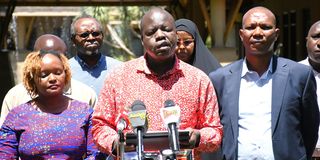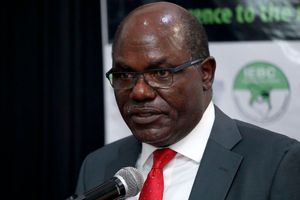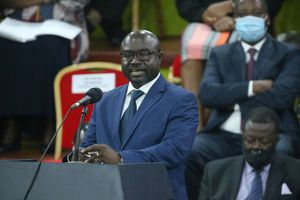
IEBC selection panel Chairperson Nelson Makanda (center), Vice Chairperson Lindah Kiome (left) and other panelists, during a media briefing at Enashipai Resort in Naivasha, Nakuru County on February 11, 2025.
We want to raise our children in a country where public institutions outlive individuals, and that those respective individuals recognise their fleeting tenure as not to interfere with the strong foundations laid by their predecessors and as cast in law for posterity of the general society.
When the framers of the Kenyan Constitution came up with Article 232 on the values and principles of public service, their hearts were heavy with the painful past of a Kenya that was ruled on the whims of one man – it was a man – on whose own selfish axis the entire nation revolved around.
The man would wake up one morning and issue life changing executive decrees without consultation of the general public, and with no due regard to the consequences on national cohesion and inter-ethnic unity of the people on whose stewardship he was entrusted with.
That is how phrases like “siasa mbaya, maisha mbaya” became normalised in public discourse to justify the exclusion of certain ethnic communities who had a historical past of keeping the government in constant scrutiny.
In sum, Article 232 read together with Article 10 on national values and principles of good governance, incited the writers of our Mother Law to institutionalise upright behaviour and fair moral standards among those entrusted with public service, while not compromising national interest and public affection.
Of all the national values and principles of good governance espoused under Article 10, none are far more conspicuous and have wide-ranging political consequences; as those of integrity, transparency and accountability – the triple core pillars buttressing institutional guardrails that hold the foundations of any nation’s democracy.
To a fair extent and without collapsing the nation-state, a public officer can compromise on human dignity, equitable distribution of public goods, even in the mainstreaming social justice and inclusiveness; but once they begin to peel away from bare minimum requirement of professional ethical codes of conduct, lowering their individual value system and closing the debate on public declarations that has the potential to risk the survival of the nation state; they begin a descent into a slippery slope that no country should ever entertain those who harbor ambitions to direct them towards.
The reasons above provide a glaring context on why Kenyans are currently conflicted on the appropriate number of words and the content of the obituary of the immediate former IEBC Chairperson, Wafula Chebukati.
Age-old arguments – mostly revolving around the immortality of the human species and the traditional culture among Africans in reaction to the dead – have been advanced to limit the scope of the scrutiny that should be directed towards Mr Chebukati’s tenure as IEBC Chair.
Proponents of this school of thought contend that the fallibility of the human soul should be taken into consideration while judging the man in whose hands we were supposed to be safe in 2022.
They also are quick to remind the general public - especially the younger generation who have loose cultural ties to their ancestral bloodline – about their national duty to preserve certain tenets of traditional culture that calls upon the respect for the dead, whether they deserve it notwithstanding.
A second set of opinion belong to those batting on the corner of truth, justice and reconciliation; and who insist on playing by the rulebook against those entrusted with public duty. Events unfolding since the June 25th Movement have taught us to always choose the side of the second group.
The Independent Electoral and Boundaries Commission (IEBC) is not any other constitutional commission.
If the Commission on Revenue Allocation (CRA), for instance, makes a mess of their revenue sharing formula and skews public resources towards a certain corner of the country, the anomaly can always be cured down the stream after a year when the new matrix is released, and minimal damage would have been done to the national fabric – if any.
Likewise, the National Police Service Commission (NPSC) could, for instance, by a glitch in the system, issue a circular announcing the promotion of undeserving police service officers causing consternation within the service ranks, and eventually clean up that mess without compromising the security of the nation state – if at all.
However, the Chairperson of the IEBC has no such wiggle room – human fallibility notwithstanding.
The moment the Chair takes to the altar to announce the results of the presidential elections, he would’ve already have had the benefit of, at most, seven days of introspection and soul searching after the last ballot had been cast.
Within the seven days, and with the benefit of technology, he would’ve already verified every result, and in consultation with his colleague commissioners, made a decision on what to do with the ones in contention.
For the first time in the history of Kenyan elections, we witnessed a commission divided right down the middle on who was the real winner of the 2022 elections, with the camp disputing the results having majority of voices within the commission. It should never happen again.
The next IEBC Chair should be a firm but consultative bridge-builder, a credible servant with an impeccable public service record, and who in the heat of the moment when the nation is teetering on the brink of disrepair; should be able to appear in public and assure the country of their patriotic duty to preserve the sovereignty of our Republic.
What Kenyans are asking for in the next IEBC Chair is a candidate who shall face the cameras in broad daylight and account for every vote cast in the determination of the next president.
The story is told of the hyena and the rock. Once upon a time, a hyena came across a rock. The hyena stopped by and greeted the rock but the rock did not respond.
As it passed the rock, the hyena turned around and said, ‘Even if you have not responded, you have heard me’.
To the IEBC Selection Panel currently retreating to shortlist the candidates for interviews, even if you keep quiet, you have heard us.









